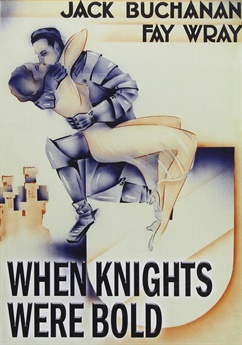| When Knights Were Bold | |
|---|---|
 DVD cover with artwork from original Swedish poster | |
| Directed by | Jack Raymond |
| Written by |
|
| Produced by | |
| Starring | |
| Cinematography | Freddie Young |
| Edited by | Frederick Wilson |
| Music by | Harry Perritt |
Production company | Capitol Film Corporation |
| Distributed by | General Film Distributors |
Release date |
|
Running time | 76 minutes |
| Country | United Kingdom |
| Language | English |
When Knights Were Bold is a 1936 British musical comedy film directed by Jack Raymond and starring Jack Buchanan, Fay Wray and Garry Marsh. [1] Songs include "Let's Put the People To Work" sung by Jack Buchanan, "Onward We Go" sung by Buchanan & soldiers' chorus, and "I'm Still Dreaming" sung by Buchanan. [2]